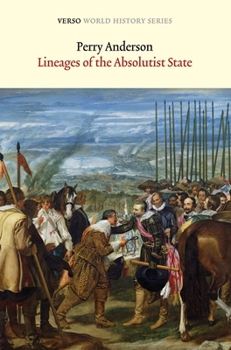Lineages of the Absolutist State
Select Format
Select Condition 
Book Overview
Forty years after its original publication, Lineages of the Absolutist State remains an exemplary achievement in comparative history. Picking up from where its companion volume, Passages from Antiquity to Feudalism , left off, Lineages traces the development of Absolutist states in the early modern period from their roots in European feudalism, and assesses their various trajectories. Why didn't Italy develop into an Absolutist state in the same, indigenous way as the other dominant Western countries, namely Spain, France and England? On the other hand, how did Eastern European countries develop into Absolutist states similar to those of the West, when their social conditions diverged so drastically? Reflecting on examples in Islamic and East Asian history, as well as the Ottoman Empire, Anderson concludes by elucidating the particular role of European development within universal history.
Format:Paperback
Language:English
ISBN:1781680108
ISBN13:9781781680100
Release Date:March 2013
Publisher:Verso
Length:576 Pages
Weight:1.65 lbs.
Dimensions:1.3" x 5.4" x 8.2"
Customer Reviews
2 ratings
A masterpiece
Published by Thriftbooks.com User , 20 years ago
This is comparative history writing at its best. I am in awe. I picked up this thick book thinking I'd just poke around at a few of the chapters but I found myself so drawn by it that I had to go back and read it from start to end (all 550+ pages). Anderson isn't just interested in historical detail, he's interested in trying to shed understanding on big fundamental questions such as why was serfdom re-imposed in the East at the same time that it was collapsing in the West, why absolutism arose at the time it did and took different shapes in different regions. Solidly argued and authoritative, I can say without exageration that this is one of the most important history books I have ever read (scratch that, this is simply one of the most important BOOKS I've ever read). It changed the way I think about economic development, absolutism and nation states. It is also well written. I found myself reading the book almost like a novel. No sooner had I finished a chapter on say Prussia that I found myself unable to put the book down because I wanted to find out what was similar but different in Poland, or Russia. Anderson has framed the questions so nicely that you just keep begging for more.
Comparative Study of Absolutism
Published by Thriftbooks.com User , 22 years ago
This is the second volume of the two part work. The first volume is ¡®Passages from Antiquity to Feudalism¡¯. On a review of the first volume, I explained the purpose of the work. So I¡¯ll go directly to the content of the second volume. This volume deals with the absolute monarchies. Absolute monarchies emerged from the crisis of feudalism which was tackled in the first volume. Anderson begins with the conventional consensus: Absolute monarchies are the reconstruction of feudal state to defend the interest of ruling class. Anderson overviews the path various countries like Spain, France, England, Italy, Sweden, Prussia, Poland, Austria, Russia, Islamic world, and Japan followed from the 16th century to the emergence of modern nation-states. The reason he covered Eastern Europe is the same one as he does in the first volume: comparative study. he argues that Western absolutism are different from Eastern absolutism. They follow different lineages. The aim of this volume is to answer the question, why the capitalism emerged in Western Europe just like the first volume. But the main point of the second volume lies in comparing Western Europe and Eastern Europe. Why did seemingly the same absolutism diverged?





